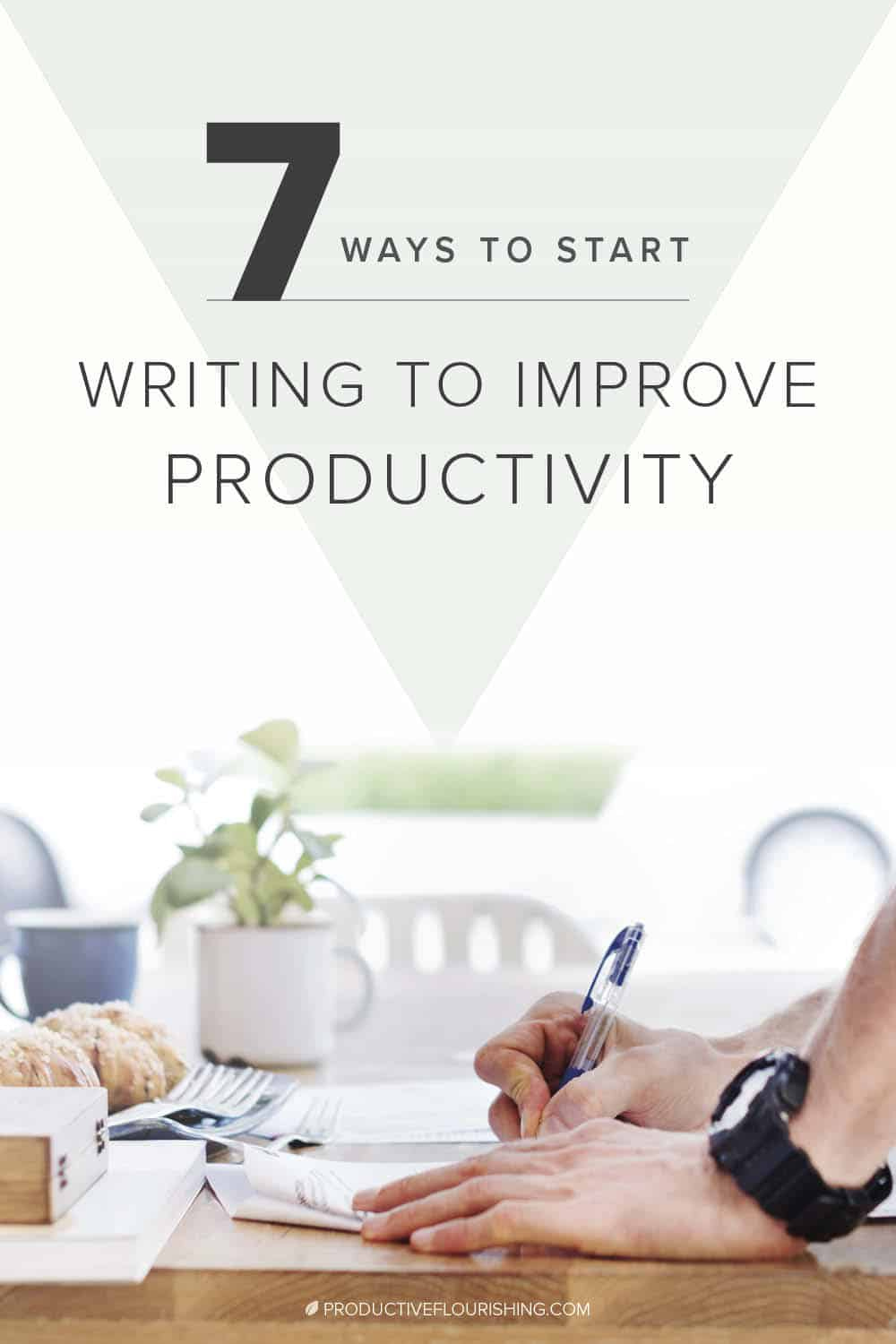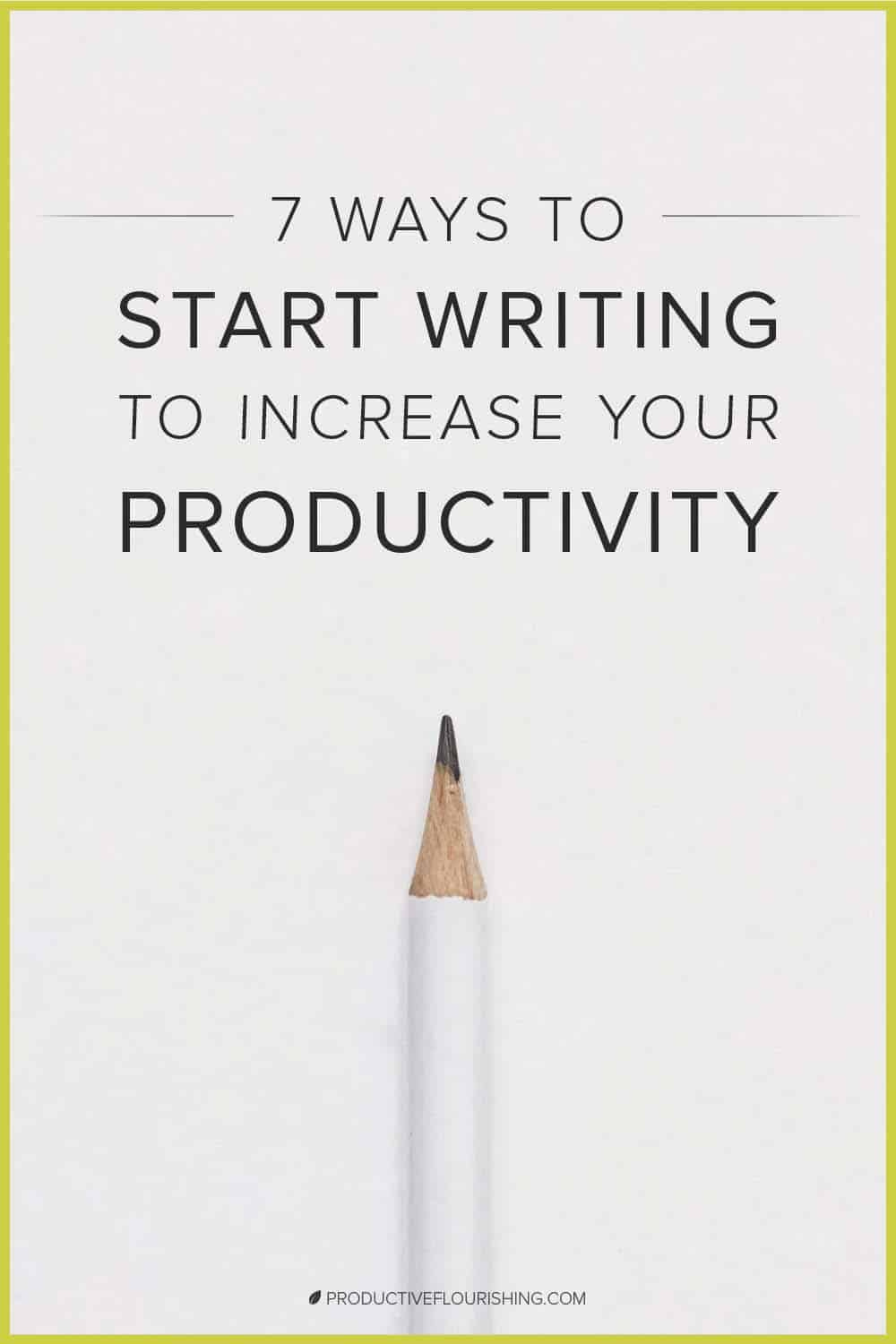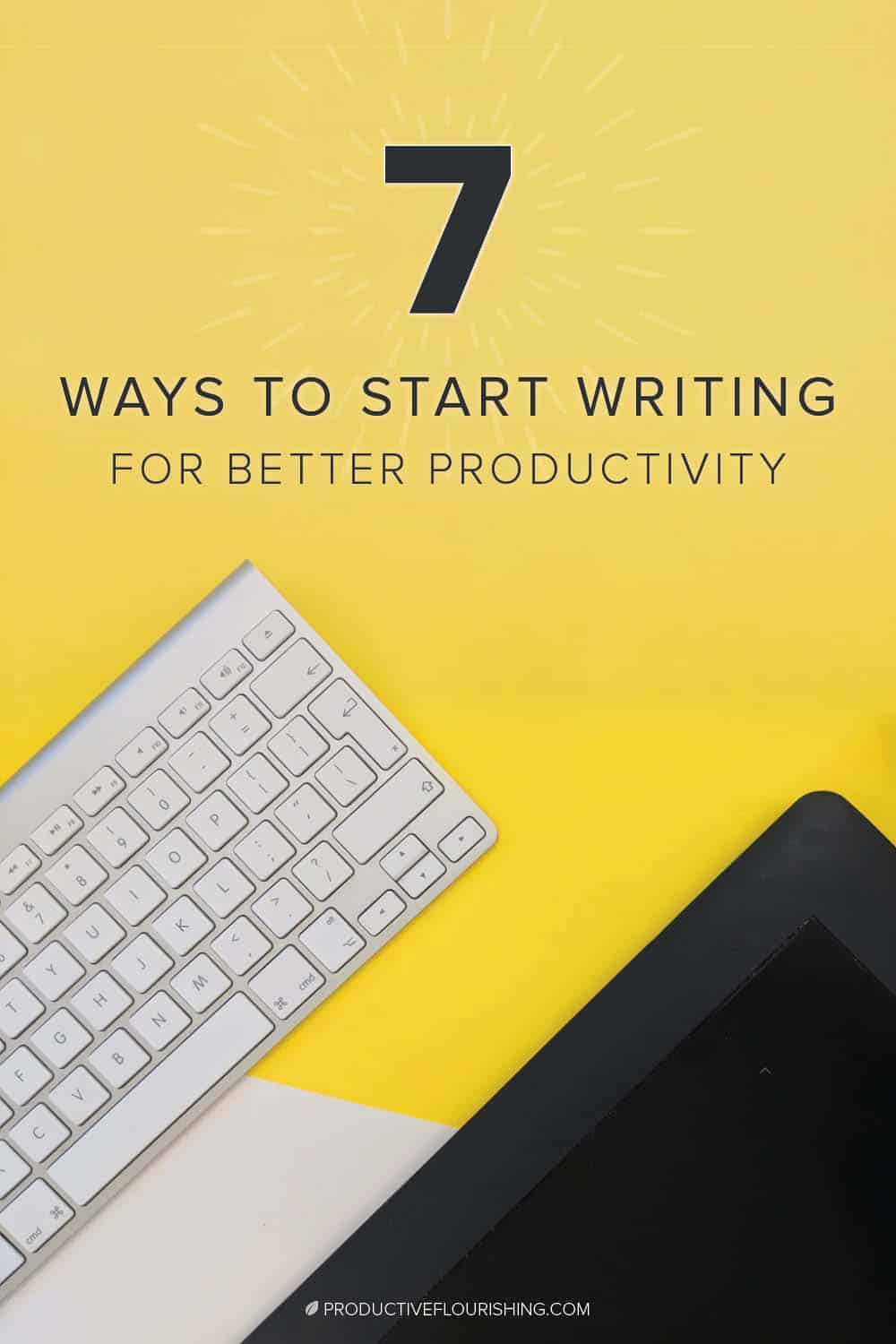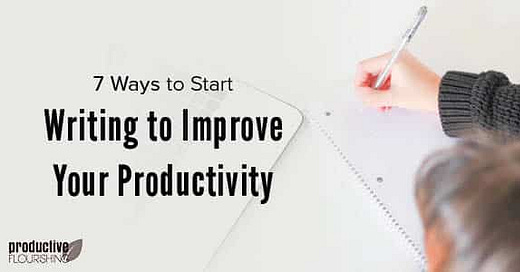7 Ways to Start Writing to Improve Your Productivity
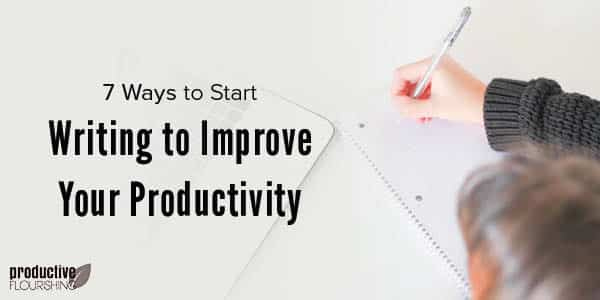
Editor’s note: This is a guest post by Nancy Seibel.
Even with the clearest of goals and intentions, I find that it’s all too easy to get distracted and end up accomplishing very little. So many things can scatter my attention. Taking on more than I can readily handle. Juggling competing interests and demands. Losing sight of what’s most important in the scramble to keep up with everything.
This problem is especially acute for solopreneurs. We must tend to all the details of running a business and provide its products or services. There’s the ongoing tension of dealing with a welter of detail while maintaining focus on the business’s mission and vision.
Problem Noted. So What Do We Do about It?
As soon as attention returns to the present moment, effectiveness increases. – Molly Gordon
Whatever the emotional or practical reasons for being distracted, it’s good to try out a range of strategies for gaining and maintaining focus. That’s because others’ productivity ideas may not fit with your natural inclinations and abilities.
As a coach and writing facilitator, I’ve found that writing is a great productivity-boosting approach for me. That’s because the act of writing is inherently mindful, bringing people into a state of awareness of their thoughts and of the present moment. Specific forms of writing, which I’ll cover below, are especially helpful as they allow you to write in detail about your experiences and deepest thoughts and feelings in order to make meaning of them. This frees your energy and attention, allowing you to be fully present for the work at hand.
...keeping a journal is one of the best strategies for learning about yourself and improving your professional performance over time. - Teresa Amabile, in Dorie Clark’s article, The #1 Productivity Tool You Aren’t Using
Writing is practical and accessible. It allows us to explore how our personal and professional lives intersect and influence each other. It’s effective and enlightening, even for those who think they can’t write. (Tweet this.)
In fact, writing skills and experience are not needed for this kind of writing because you’re the only audience. No one else will read or critique what you write. The important thing is the writing process, not the product. PRODUCTIVE FLOURISHING
Experiment with Writing
You might be feeling a little skeptical of all this, so I invite you to test this kind of writing for yourself. Conduct a small, short-term experiment that won’t take much time and won’t cost you anything.
Design Your Experiment
Start to design your writing experiment by identifying your question. For example, “How can I get myself started writing regularly?”
Brainstorm your ideas, and choose one that is simple, specific and one that you can commit to. For instance, “I will write at 7 a.m. on Mondays, Wednesdays, and Fridays for at least 10 minutes.”
Then keep track of the experiment’s impact by keeping brief daily or weekly notes on how regularly you write and about your focus, attention, and productivity.
The Innovator’s Compass, a design thinking tool I’ve used a lot since discovering it a year ago, can help you put a little more structure to your experiment. Check it out — you might find it helpful.
Get Started
Once you design your writing experiment, plan to write regularly for a month or two. This should be enough time to see if you like the exercise and find it useful. In addition, you can use the following seven tips to remove the usual obstacles to beginning a writing practice that will enhance your personal life and bring greater productivity to your work life.
Write for 3-20 minutes each day or each week. If you want to spend more time writing, monitor the effect of the increase. If you’re getting tired, it’s time to stop.
Avoid rumination. Repeating the same thoughts, in the same words, over and over can have a negative impact.
Turn off any self-criticism. Let your writing flow. Don’t worry about making it perfect.
Encourage yourself for continuing to write, even if you miss a day.
Express your deepest thoughts and feelings openly and honestly. (See tip #3.)
Keep your writing private. It may not be in your best interests to have someone read what you write. Destroy your writing after you’re done, find a safe place to store it, or use a password-protected e-file.
Reflect on your writing, noting what the experience was like, what you are learning, and how it is impacting you and your productivity.
Next we’ll look at two common issues that can affect productivity and the forms of writing that can help you address them.
1. You Have a Lot on Your Mind
Sometimes you don’t even know what had been on your mind until you write it down. – Craig Jarrow
Maybe there’s a pressing issue on your mind, or a project you just can’t get started on. Whether its a personal, professional, or societal issue, it’s taking up enough energy that you can’t concentrate on your work.
Try Topical Stream of Consciousness Writing
Just start writing about the concern, whatever it is. Let the words flow without trying to use a specific format. Follow where the writing is going, even it’s leading you in an unexpected direction. Often, that’s where you make discoveries! Try to notice if you’re avoiding certain thoughts or feelings. If that’s the case, you might want to write about what you’re avoiding and why.
Some prompts that can help you get started:
Thinking about ______ brings up a bunch of disconnected thoughts, including _______________.
I have so many strong feelings about _______, such as _________.
I’m not sure what’s really bothering me, but maybe it’s ______.
Topical stream of conscious writing can help by:
Allowing you to collect your thoughts.
Helping you express what’s going on in your mind. Once expressed, the feelings and thoughts can be released, or at least put aside for the time being.
Connecting with your deepest thoughts, feelings, beliefs, and values.
Promoting discovery of new ideas or solutions to problems.
Identifying who you might reach out to for help or support.
2. You Get Distracted Easily
...being mindful simply means shifting from being caught up in our thinking to being aware of our thinking. – Matt Tenney
You’re feeling stressed, distracted, uninspired. Perhaps personal problems, regrets about the past, or worries about the future are interfering with your focus. These are among the things that mindfulness practices are known to address. Meditation is a well-known mindfulness practice. Writing is, by its nature, a mindful practice that brings awareness to thoughts and a focus the present moment. Both of these are practices that help us shift from “...being caught up in our thinking to being aware of our thinking.”
Try the Six A’s of Mindful Writing
Educator, coach, and author John Evans developed the Six A’s of Mindful Writing, basing the prompts on the work of mindfulness expert Jon Kabat-Zinn.
Here’s how the writing exercise works. Either complete each prompt by noticing what Is in your surroundings and your thoughts; or hold a particular question, concern, or situation in mind as you work through the prompts. Spend 1-3 minutes on each prompt, writing a single sentence or a short paragraph in response.
I am aware of…
I pay attention to…
I accept that…
I appreciate that…
I have affection for…
I affirm that...
The Six A’s of Mindful Writing help you by:
Enabling you to focus your attention and reduce distraction.
Allowing you to work more efficiently and accurately.
Increasing physical and emotional well-being, which enhances productivity.
Strengthening the immune system, increasing resilience, and reducing burnout.
Improving decision-making by helping you let go of preconceived ideas and biases.
Focusing your efforts on what is important and meaningful.
Are you ready to experiment with writing to improve your productivity? Do you have questions about anything in this post? Let me know in the comments, or contact me through my website.
Sources
Kabat-Zinn, J. (2018). Meditation is not what you think: Mindfulness and why it is so important. New York, NY: Hachette Books Pennebaker, J. W., & Evans, J.F. (2014) Expressive writing: Words that heal. Enumclaw, WA: Idyll Arbor.
